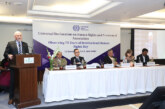If 2020 was the year of rapid and unprecedented breakthroughs on vaccines, 2021 will be the year of getting it across to people
ANALYSIS Updated: Dec 21, 2020, 19:49 IST

Harsh Vardhan
The year 2020 has been the “Year of Science”, when the best of humanity has shone through the gloom that descended upon us due to the Covid-19 pandemic. It is a matter of record that as the spread of the disease accelerated, so did research efforts to mitigate this.

Major global collaborations were set up so that scientists could share their expertise, and plans were implemented to speed up clinical trials so that treatments, vaccines, and diagnostics could take place quickly, without compromising safety. For all this work, governments, businesses, and philanthropic organisations got together and started committing resources. Both science, and the deepening of international collaboration, has been remarkable features of the year.
In fact, the dedication of scientists across the globe has been laudable, not just for producing a string of life-saving breakthroughs but for doing so at an unprecedented pace. I applaud each organisation that has supported the research response to Covid-19 and made us proud.
The biggest success of this pandemic has been teamwork and science community putting the right outcome ahead of individual rewards. Scientists and organisations actually focused on delivering on meaningful goals, whether it was across nations, across continents, or indeed, the world. During the pandemic, scientists exhibited that we can deliver at any pace, retain the quality of our diagnostics and care, and build confidence and trust that speed doesn’t mean lack of quality.
I have always personally believed that the fruits of our collaboration on science and health care need equitable distribution. We must deliver those to everybody in the world, and create a more equal world. As chairman of the executive board of the World Health Organization, I have been talking about this to countries, funding agencies, scientists and philanthropists. There is commitment from everyone and I consider that among the most important outcomes of 2020.
The pandemic has only reinforced the science community’s consistent and indefatigable efforts in addressing societal problems stands. It would not be an exaggeration to say that a great deal of the developmental work that has been achieved by our government in the last six and a half years bears the hallmark of efforts made by our scientists, technology experts and innovators. The effort to organise the India International Science Festival (IISF) since 2015 is to celebrate exactly this fact.
IISF’s aim is to engage the public with science and showcase how science, technology, engineering and mathematics (STEM) provide us with solutions to improve the quality of our lives. The ministry of science and technology and the ministry of earth sciences, in association with Vijnana Bharati (VIBHA), have created this unique platform called IISF which intends to inspire curiosity and make science learning more rewarding.
The festival aims to reach out to the student community so as to ignite their scientific spirit. What started as a small event, has now matured into a much-awaited annual scientific gathering involving students, scientists, academia, media, and the general public. IISF is a platform open for people from all sections of society and from diverse backgrounds to experience and enjoy science activities, achievements and innovations in all spheres of life. Every edition of IISF has grown bigger and better, and emerged as an eagerly awaited celebration of science. Scientific events at the IISF have broken global records and have entered the prestigious Guinness Book of World Records.
IISF is being celebrated virtually this year, from December 22 to 25. The Council of Scientific and Industrial Research (CSIR), through its National Institute of Science, Technology and Development Studies (CSIR-NISTADS) is organising this mega virtual event. The theme of IISF2020 is “Science for Self-Reliant India and Global Welfare”, which is based on the clarion call given by Prime Minister Narendra Modi for building a self-reliant India that can contribute to global good. This four-day science festival aims towards strengthening and expanding the soft power of our nation globally. As many as 41 different events covering STEM disciplines have also been included in the IISF 2020 to attract young and innovative minds.
If 2020 has been the year of discovery for Covid-19 vaccines, 2021 will be the year we face the challenge of getting it across to people across the world who most need it.
This IISF-2020, let’s take the pledge to redouble our commitments to put an end to the current pandemic and to further enhance cooperation that makes lifesaving science possible.
With all its devastation, 2020 has been a great scientific success story. For me, the recognition of scientists as first responders to grave humanitarian threats is really important. At the same time, ensuring all low and middle-income countries have access to safe and effective Covid-19 tests, treatments and vaccines is the outstanding challenge. To the scientists who gave everything to vaccines, tests and treatments this year, a big shout out and a bigger thank you.
Harsh Vardhan is the Union minister for science & technology, earth sciences, health, & family welfare
The views expressed are personal
Post Source : Hindustan Times



